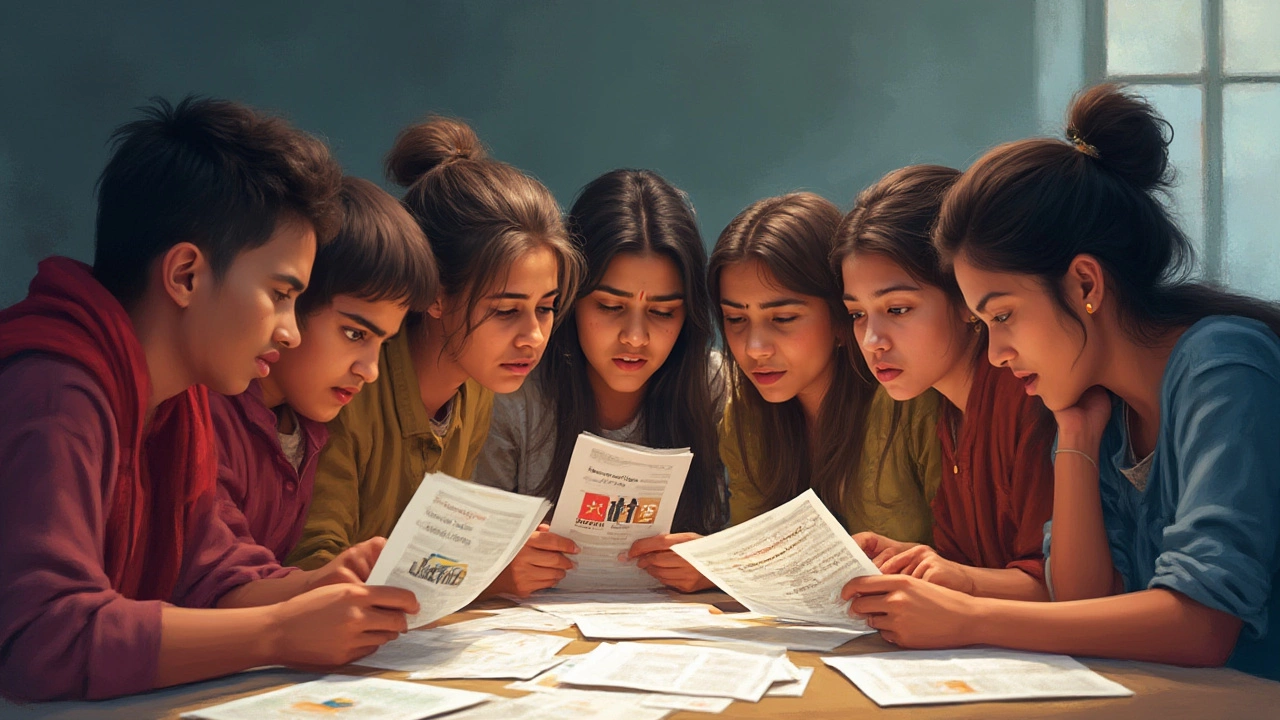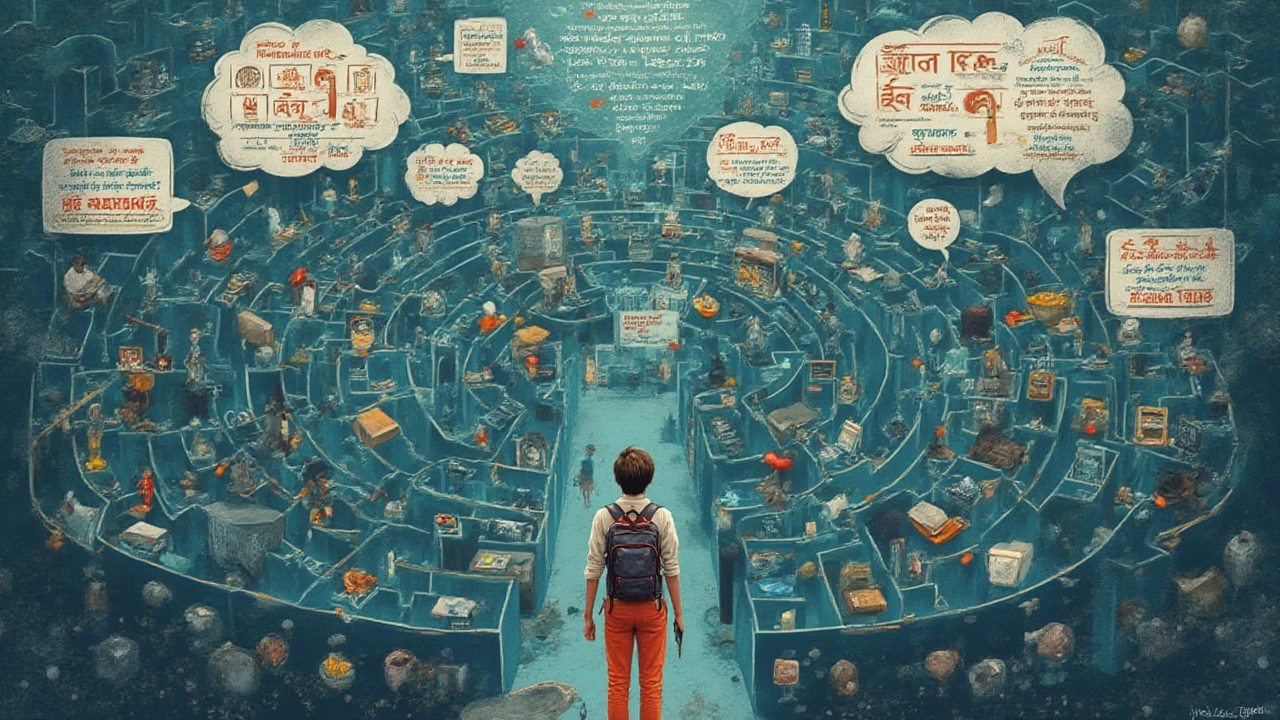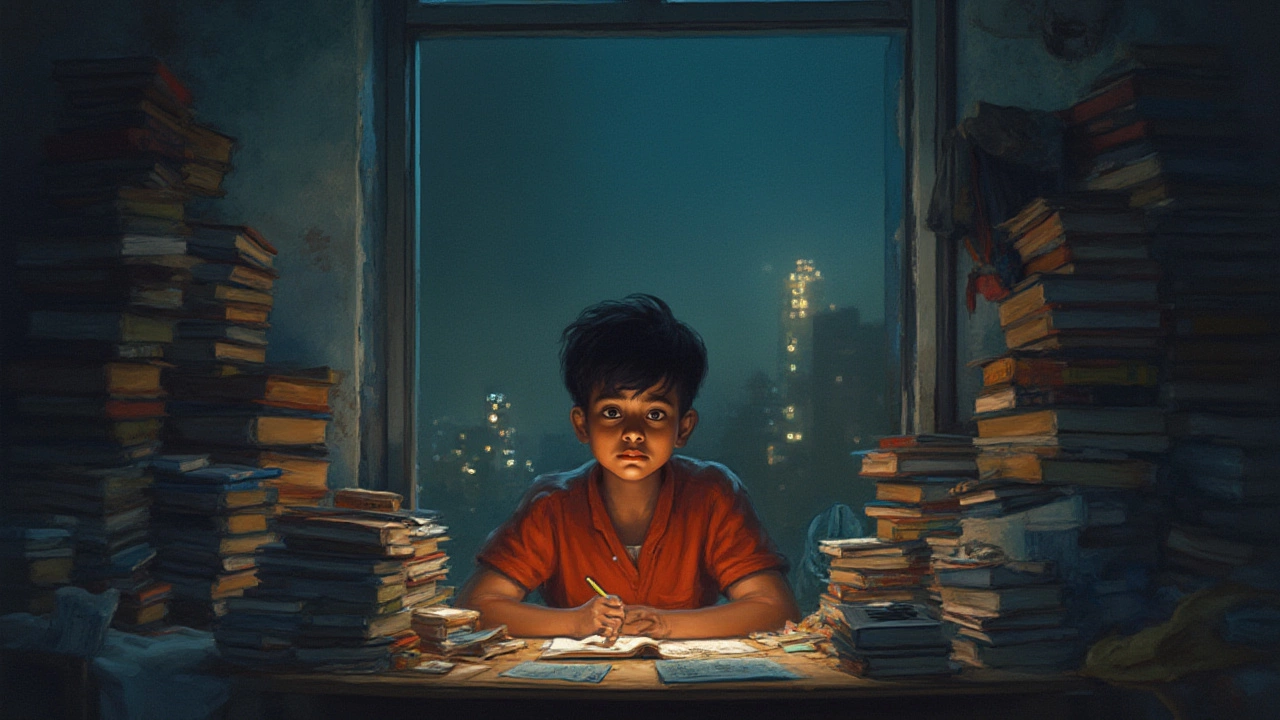Not many things spark fierce debates among parents at a weekend barbecue like the topic of school board exams. You’ll hear everyone tossing names around: CBSE, ICSE, IB, A-Levels, even boards from Japan or Finland. But if you strip away the myths, the emotional stories, and the slick marketing of 'world-class education,' what actually is the hardest board in the world? Pick just one? Trust me, that’s as controversial as arguing over who makes the best coffee in Sydney—everyone’s got an opinion, and the arguments can go all night.
What Makes a Board Exam 'Hard'?
The word 'hardest' isn’t as simple as it sounds. Some boards stress depth, some hammer on speed, others flex with creativity or pile on pure volume. Take my son Nihal—he groans about his maths homework every Thursday, but even he admits not all boards are created equal. Let’s break it down: what actually makes a board exam tough?
Start with syllabus breadth. Some boards squeeze in topics that would give adults night sweats. For example, the Indian CBSE Class 12 covers advanced calculus, molecular biology, and you might be tackling philosophy, too. Compare that with the British A-Levels, which might limit you to three or four subjects, but expect university-level essays and problem-solving. Or look at the International Baccalaureate (IB). It may be just six subjects, but there’s the Theory of Knowledge essay, the Extended Essay, and Creativity, Activity, Service (CAS) hours—all at once! Depth, breadth, and holistic effort are all dialed up.
Then factor in exam style. Some boards, like Singapore’s GCE A-Levels, are notorious for their rigor and time crunch. Here’s a graph to help see exam length and number of papers for various boards:
| Board | No. of Exam Papers | Avg. Exam Duration (hrs) | Pass Rate (%) |
|---|---|---|---|
| CBSE (India) | 5-6 | 3 | 85 |
| ICSE (India) | 6-8 | 2.5 | 98 |
| GCE A-Levels (UK/Singapore) | 3-5 | 2 | 76 |
| IB Diploma | 6+ | 3 | 79 |
| Gaokao (China) | 3-7 | 3 | 60 |
Difficulty can also come from marking: some boards are famous for being stingy with marks. Try scoring a perfect in IB or in China’s Gaokao—it’s almost legendary if you do. This sort of grading standard can make even confident kids—like my daughter Kavya, who’s usually calm tackling maths—break out in a nervous sweat.
Language can be a hidden hurdle. Boards like the French Baccalauréat or Japan’s National Center Test deliver questions in the native language, and some even toss in ancient classics or extra languages on top.
As a tip: Before assuming a board is the 'hardest,' consider not just high marks, but the curve, culture, teaching style, and how it’s tested. It’s like comparing marathon runners in different climates—you can’t just look at race times.
Famous Boards Known for Brutal Challenge
Globally, a handful of boards keep coming up when you ask about the toughest: China’s Gaokao, the International Baccalaureate (IB), Singapore GCE A-Levels, the French Baccalauréat, and India’s CBSE Senior Secondary and ICSE boards. Each offers its own brand of misery, brilliance, and stress.
China’s Gaokao is legendary. This two-day test is often called the world’s hardest school exam. With about 12 million students appearing in 2024, the competition is downright savage. Success or failure here basically decides your entire future, and parents don’t take it lightly: hotels near test centers are booked a year in advance, and stories of sleepless nights, tutors, dietary regimes, and 'Gaokao bootcamps' fill Chinese social media. The test includes Chinese, Mathematics, a foreign language (usually English), and either Science or Humanities depending on your stream. The kicker? The cut-off for entry to top universities is so steep, one wrong answer can knock you out of your dream college. The psychological toll is huge.
Then you have the IB Diploma. The IB’s reputation for difficulty is as much about the student’s workload as the exams themselves. Along with standard exams, there’s the Extended Essay (basically a mini-thesis), internal assessments in every subject, and those infamous CAS hours—volunteering plus creative projects. IB students juggle assignments, research, and extra projects almost non-stop.
Singapore’s GCE A-Levels, run jointly with Cambridge, aren’t just a British import—they’ve evolved their own unique flavor of torture. Only about a third of the cohort scores grades that even make a splash, and the creativity plus exam speed required often leaves even bright kids gasping.
India’s CBSE and ISC/ICSE boards train millions for competitive university exams, which are another leap in stress. These boards aren’t just hard because of content, but because the system rewards speed and retention: think heavy textbooks, marathon study schedules (I know families who barely see their kids in 'board year'), and the social expectation that high scores are everything.
The French Baccalauréat, or 'Bac,' is known for its broad range—students pick specialties but still must tackle literature, philosophy, math, and sciences. The essay questions are famous. Imagine writing pages on topics like “Is happiness necessary for freedom?” or “Can science judge the value of art?”—and all in French. The pass rate is high, but top scores are rare.
Quick tip: When scouting a school board for your kids, weigh not just reputation but actual past papers. Sometimes, local horror stories get blown out of proportion or downplayed. If you can, talk to kids doing the board now—get real-time feedback, not just old war stories from relatives.

How These Boards Shape Student Lives
No matter which board you pick, its culture shapes more than grades: it molds personalities, stress levels, and even future plans. Take Gaokao—most Chinese families schedule life around it, sacrificing hobbies, holidays, even meals, for years. Mental health? There’s increasing awareness now, but burnout rates are legendary.
The IB is big on building 'international-mindedness,' but it also creates a certain type of student—resilient, yes, but always juggling deadlines, always under pressure. The focus isn’t rote learning, but balancing research, sports, service, and critical thinking. IB students often excel at university, but many look back and joke about never wanting to see another citation again.
GCE A-Level students become experts in targeted study. The depth is university-level, and kids pick subjects early, so there’s less breadth but way more depth. In Singapore, the bell curve is vicious: small mistakes can torpedo your ranking versus thousands of other top students.
In India, the CBSE and ICSE boards are notorious for setting the path to engineering and medical entrance tests. Stories abound of kids locked into tuition marathons, missing out on sports or the arts simply because every extra mark counts. These boards are evolving; recent years saw more focus on projects or application, but in 'board year,' textbooks still rule.
French Bac students face a different challenge: mastering argumentation and synthesis. Writing long essays is the daily bread, and many say the philosophy paper terrifies them more than maths. But it builds a student who can really argue a point or untangle a knotty idea.
Here’s a dad tip I learned late: Always ask what your child values. Kavya, for example, adores debate and languages, so structures like the Bac or IB fit best. Nihal enjoys logic and quick calculation—something like A-Levels or CBSE lets him focus deep where he thrives. If your child is creative, avoid a board that prizes only memorization.
Comparing the Toughest: Data, Stories, and What Actually Matters
Numbers sometimes tell a story better than anecdotes. Here’s a quick rundown from reliable 2024 data on how the toughest boards compare:
| Board | Avg. Candidates/Yr | Success Rate (%) | Avg. Study Hours/Week |
|---|---|---|---|
| China Gaokao | 12 million | 60 | 50+ |
| IB Diploma | 170,000 | 79 | 40-45 |
| Singapore GCE A-Levels | 37,000 | 76 | 35-40 |
| India CBSE (12th) | 1.5 million | 85 | 35 |
| French Bac | 700,000 | 92 | 25-30 |
Stats only tell part of the tale. The Gaokao's notoriously low pass rate and jaw-dropping study hours explain its fearsome rep. But in places like France, the high pass rate is offset by the difficulty of getting 'mention très bien'—the highest distinction. IB’s pass rate may seem generous, but top grades are rare. In Singapore, the bell curve means even a few mistakes can knock you out of scholarship chances.
The workload for each board is shaped by culture. Chinese students see education as a path to better circumstances—families sometimes move cities just for a better shot at Gaokao success. For IB, a key element is managing not just academics but also outside-school projects and community service, which suits international-minded teens. Singapore’s system pushes kids to focus, memorize and think analytically, with creativity built into testing style.
Here’s something most people miss: the hardest board isn’t always the one with the biggest book or longest exam. It might be the one that best matches—or mismatches—your learning style or emotional health. One study in 2023 found IB students reported the highest 'academic burnout,' but also the highest self-reported 'preparedness for university.' Gaokao students have pride in their endurance, but also the highest mental health absences among tested school populations in Asia.
A pro tip parents rarely hear: Don’t chase the hardest just for prestige. The 'best fit' board is the one that will push your child to grow without breaking them. Plenty of stories prove it: I’ve seen students miserable in top boards, thrive once they switch to something less hyped but better aligned to their real interests.

Tips for Surviving—and Even Thriving—Under the Hardest Boards
Let’s cut through all the stress talk and look at what can help your child not just survive, but actually thrive, if you’re stuck in or considering one of these powerhouse boards. I’ll pull from my experience as a parent, but also the tips I hear whispered at every parent-teacher night.
- Never let the fear of the 'world’s hardest exam' drive all choices. Recognise your child’s strengths and weaknesses early.
- Always test with real past papers—don’t just rely on mock exams or sample questions published by schools. Authentic materials show the true standard.
- Use a planner with daily goals—not just a broad, monthly schedule. With boards like IB or Gaokao, breaking workload into bite-sized steps is magic.
- Don’t buy endless guidebooks. Choose one authoritative source—in IB, the official mark schemes; in A-Levels or CBSE, the best teacher-recommended books.
- Join student forums or peer groups. Kids struggling with the same syllabus can swap notes, share stress-busters, or just tell a bad exam joke when you need it most.
- Prioritize mental health. Boards like Gaokao, IB, and A-Levels put huge pressure on teens. Open lines of communication—at my house, Sunday evenings are for venting without any judgment.
- Celebrate small wins. Every tough assignment finished, every past paper done—mark it. Avoid waiting for 'big' moments, which come rarely in the grind of tough boards.
- For boards with broad electives (like IB or Bac), choose subjects that excite and challenge, not just ones 'looked good' on university forms. Passion equals higher marks in the end.
- Don’t feel tied to a board’s reputation alone. The world’s university admissions teams are increasingly 'board-neutral'—they care far more about grades, interests, and personal essays than which board you did.
- Ask for help—early, not when the wheels fall off. In competitive boards, early intervention makes the biggest difference in grades, confidence, and sanity.
At the end of the day, the hardest board in the world isn’t just about the tough syllabus or brutal exams. It’s the one that stretches you without breaking your spirit, that builds resilience without crushing curiosity. As a parent living in Sydney, watching my kids wrestle with homework each night, I get it—the stress is real. But so is the sense of triumph, when they conquer a subject they thought impossible or nail a test they dreaded. And when they do, you realize it’s not just about surviving the world’s hardest board—it’s about finding joy in learning, right when the odds seem highest against you.

